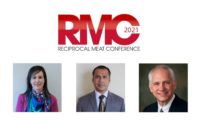The American Meat Science Association (AMSA) has announced Dr. Temple Grandin and Dr. Karen Schwean-Lardner will be the featured Keynote speakers in the symposium entitled “Animal Welfare” on Tuesday, August 4, 2020 during the 66th International Congress of Meat Science and Technology (ICoMST) and the AMSA 73rd Reciprocal Meat Conference (RMC) exclusively virtual meeting. This symposium will be sponsored by Merck Animal Health.
The featured presentations include:
Livestock Handling at the Abattoir: Effects on Welfare and Meat Quality: Low stress handling that uses behavioral principles can help reduce bruises and improve meat quality in cattle, pigs, and sheep. Short-term stressors shortly before stunning, such as electric prod use or jamming in the race may increase Pale Soft Exudative (PSE) in pork and reduce tenderness in beef. Longer-term stresses may increase Dark Firm Dry (DFD) meat. Continuous assessment of livestock handling practices is recommended. Handlers should be trained to move small groups of livestock. They also need to understand behavioral principles such as the point of balance at the shoulder. Simple economical improvements in races and lairages help facilitate animal movement through the facility. Dr. Temple Grandin, Colorado State University Professor of Animal Science, and pioneer in improving the handling and welfare of farm animals, will discuss solutions to improve animal welfare at the abattoir. Dr. Grandin is also the recipient of the 2020 AMSA International Lectureship Award sponsored by PIC.
Poultry Welfare – Future Directions and Challenges?: The emphasis on poultry welfare has changed dramatically over the past 2-3 decades, and as a result, the quality of life of broilers, laying hens and turkeys has improved. In this presentation, Dr. Karen Schwean-Lardner, Professor at the University Saskatchewan in the Department of Animal and Poultry Science, will review two such areas – one in which the direction of the consumer push for a specific change is not completely supported by the scientific literature, and the second, where environmental and economic factors may suffer as a result of the changes. Such areas of change may arise in industry challenges in the future. Perhaps, using a balanced approach when considering factors where bird welfare and environmental costs collide, in conjunction with allowing consumers choice over the products they purchase, could offer the industry a more sustainable direction to continue in.
The 66th ICoMST and AMSA 73rd RMC will be held August 3-6, 2020 online in the virtual format. For more information please visit: www.icomst2020.com or contact Deidrea Mabry 1-800-517-AMSA ext. 12.
Source: AMSA




Report Abusive Comment